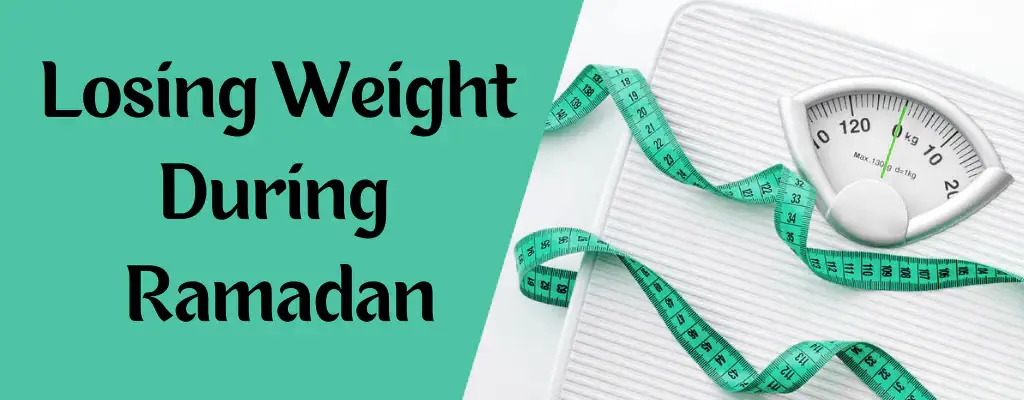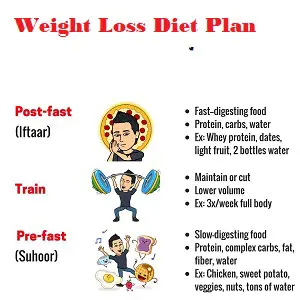Ramadan is a holy month for Muslims, during which they observe fasting from dawn until sunset. Fasting during Ramadan can be a challenge, but it is also an opportunity to focus on one’s physical and spiritual well-being. For those who are looking to lose weight during Ramadan, it is possible to do so in a healthy and sustainable way. In this article, we will provide some tips on how to lose weight during Ramadan.
Table of Contents
Plan Your Meals Wisely
Planning your meals during Ramadan is crucial if you want to lose weight. You should aim to have two main meals each day: Suhoor, which is the pre-dawn meal, and Iftar, which is the meal you have after sunset. Suhoor should be a nutritious and filling meal that will help you sustain your energy levels throughout the day. It is important to choose foods that are high in fiber and protein, such as whole grains, vegetables, and lean protein sources like chicken, fish, or tofu.
For Iftar, it is important to avoid overeating or consuming too many calorie-dense foods. You can break your fast with a date and a glass of water, followed by a light meal that includes soup, salad, and a small portion of main dish. Avoid fried and fatty foods, sugary drinks, and processed foods. Instead, opt for grilled or baked meats, vegetables, and whole grains.
Stay Hydrated
During Ramadan, it can be easy to forget to drink enough water, especially when you are fasting. However, staying hydrated is essential for weight loss and overall health. Dehydration can lead to overeating, fatigue, and headaches. Make sure to drink at least 8 glasses of water between Iftar and Suhoor, and avoid sugary drinks and caffeine, which can dehydrate your body.
Exercise
Exercising during Ramadan can be challenging, especially if you are fasting. However, it is still possible to stay active and burn calories. Try to exercise before Iftar or after Suhoor, when your energy levels are at their highest. Choose low-intensity exercises such as walking, yoga, or stretching, which will help you maintain muscle mass and burn fat.
Get Enough Sleep
Getting enough sleep is crucial for weight loss, as lack of sleep can lead to overeating and weight gain. During Ramadan, it can be difficult to maintain a regular sleep schedule, but try to get at least 7-8 hours of sleep each night. Avoid staying up late or engaging in stimulating activities before bed.
Seek Professional Advice
If you have any health concerns or are unsure about how to lose weight during Ramadan, it is important to seek professional advice. Consult with a registered dietitian or a healthcare provider who can provide personalized advice and guidance.
Breaking Bad Habits Through Fasting
Ramadan is a time for spiritual reflection and self-improvement. Fasting can help you break bad habits, such as overeating, snacking, and consuming unhealthy foods. Use this opportunity to establish healthier habits by planning your meals, practicing portion control, and avoiding mindless eating.
Increase Your Protein For Suhour & Iftar
Protein is an essential nutrient that can help you feel full and satisfied. Aim to include protein-rich foods in your Suhoor and Iftar meals, such as eggs, nuts, beans, and lean meats. This will help you maintain muscle mass and prevent muscle breakdown, which can occur during prolonged fasting.
Reduce Your Carb Intakes
Carbohydrates are an important source of energy, but consuming too many carbs can lead to weight gain. To reduce your carb intake, focus on eating complex carbs such as whole grains, vegetables, and fruits, instead of simple carbs such as white bread and sugar.
Stay Active
Staying active during Ramadan can be challenging, but it is important for weight loss and overall health. Try to engage in low-intensity exercises such as walking, yoga, or stretching, for at least 30 minutes a day. This will help you burn calories, improve your mood, and boost your energy levels.
Avoid Fruit Juices And Soft Drinks
Fruit juices and soft drinks are high in sugar and calories and can lead to weight gain. Instead, opt for water or herbal tea to stay hydrated. You can also add lemon or cucumber to your water to enhance its flavor.
Limit Desserts
Desserts are often high in sugar and calories and can derail your weight loss goals. Instead of indulging in desserts every day, try to limit them to once or twice a week. You can also opt for healthier dessert alternatives such as fresh fruit or a small serving of dark chocolate.
By incorporating these tips into your Ramadan routine, you can lose weight in a healthy and sustainable way. Remember to listen to your body and consult with a healthcare professional if you have any health concerns.
Conclusion
In conclusion, losing weight during Ramadan is possible with the right mindset, planning, and preparation. By following these tips, you can stay healthy, lose weight, and reap the spiritual benefits of Ramadan.



